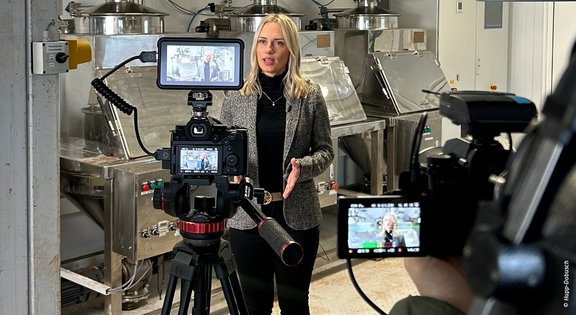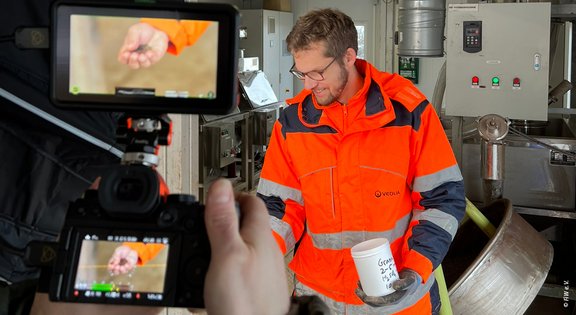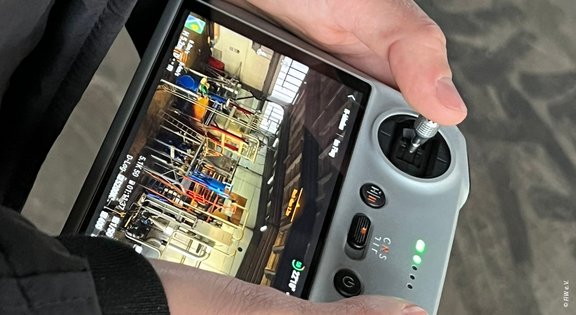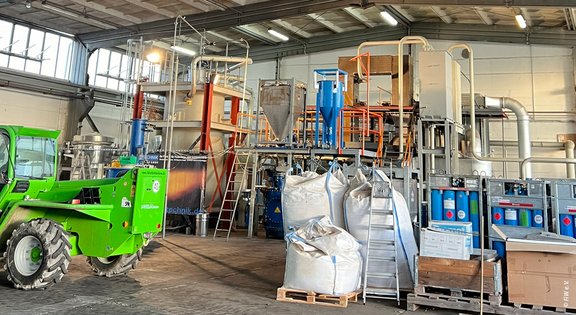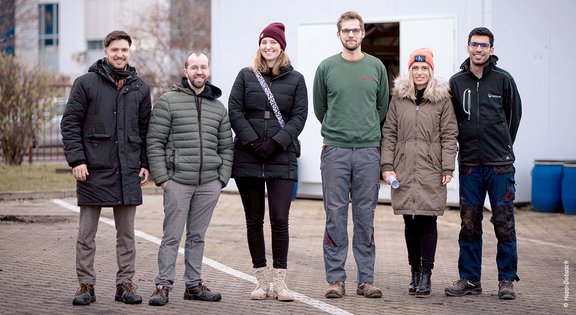The accompanying project TransPhoR, coordinated by FiW, is producing a total of seven short films for the funded joint projects as part of the BMBF funding measure Regional Phosphorus Recycling (RePhoR). The DreiSATS project kicked things off on December 12 in Markranstädt and Magdeburg.
Public relations work is also becoming increasingly relevant in research projects. Particularly in the case of a topic that appears inaccessible at first glance, such as phosphorus recycling, which is still far from reaching the general public, it requires the use of a wide variety of media to generate enthusiasm for the project content - and thus also to justify the funding to the public. As a scientific support and transfer project, TransPhoR sees it as its task to strengthen communication between various stakeholders. To this end, a short film was produced in the summer with the background to the funding measure. In the coming months, short films will also be produced for the individual collaborative projects to provide an insight into the objectives and the outlook beyond the project duration.
The DreiSATS project made the start. On 12.12.23, our employee Sophia Schüller (TransPhoR) and the film crew from Hupp-Dobusch were able to visit the project's test facility at Veolia Klärschlammverwertung Deutschland GmbH (VKD) in Markranstädt and the pulverized fuel furnace at Carbotechnik in Magdeburg. Project coordinator Claudyn Kidszun (VKD) and her team, Peter Schöfmann from Carbotechnik and Dr. Marc Lincke from Fraunhofer IKTS accompanied the filming of the project with the utmost commitment. We would like to thank them for their great and professional cooperation!
Phosphorus is an essential and non-substitutable building block in all living organisms and is needed above all as a fertilizer for high-yield agriculture. The finite phosphate ore reserves are limited to a few, sometimes politically unstable regions in the world and are increasingly contaminated. Germany, like almost all countries in the European Union (EU), has no raw phosphate deposits of its own and is therefore completely dependent on imports. This leads to major risks in terms of security of supply and vulnerability to price fluctuations. The EU therefore placed phosphorus on the list of critical raw materials back in 2014 to incentivize recycling activities. The recovery of phosphorus from P-rich waste streams, such as wastewater and sewage sludge, plays an important role in securing future supplies.
As part of the BMBF-funded measure Regional Phosphorus Recycling (RePhoR), large-scale recovery is therefore being implemented and supported in seven joint projects. Various obstacles impede the market entry of fertilizer recyclates. These include inconsistent or unclear legal regulations on pollutant limits, the certification process, but also factors such as the social acceptance of new products.
The aim of DreiSATS is the practical prototype testing and demonstration of an innovative, economically and technically viable process chain for thermal sewage sludge utilization with phosphorus recycling and product utilization for the model region "Central German border triangle". The aim is to demonstrate on a technically relevant scale that marketable fertilizer products can be produced from sewage sludge in consistently good quality and quantity and can be used both regionally and, if necessary, supra-regionally. The project is coordinated by Veolia Klärschlammverwertung Deutschland GmbH (VKD) and carried out together with the project partners Carbotechnik GmbH, LTC Lufttechnik Crimmitschau GmbH, Pontes Pabuli GmbH and the research institutes Fraunhofer IKTS and MFPA Materialforschungs- und -Prüfanstalt an der Bauhaus-Universität Weimar. You can find more information on the RePhoR homepage at https://www.bmbf-rephor.de/verbundprojekte/dreisats/ or the project homepage https://www.dreisats.de.






